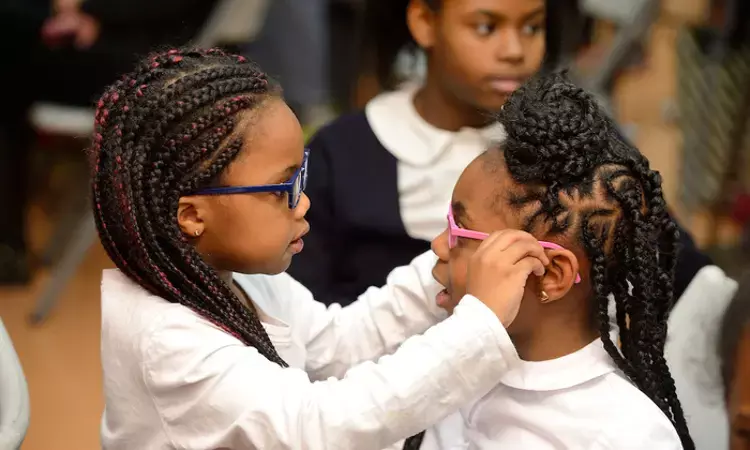- Home
- Medical news & Guidelines
- Anesthesiology
- Cardiology and CTVS
- Critical Care
- Dentistry
- Dermatology
- Diabetes and Endocrinology
- ENT
- Gastroenterology
- Medicine
- Nephrology
- Neurology
- Obstretics-Gynaecology
- Oncology
- Ophthalmology
- Orthopaedics
- Pediatrics-Neonatology
- Psychiatry
- Pulmonology
- Radiology
- Surgery
- Urology
- Laboratory Medicine
- Diet
- Nursing
- Paramedical
- Physiotherapy
- Health news
- Fact Check
- Bone Health Fact Check
- Brain Health Fact Check
- Cancer Related Fact Check
- Child Care Fact Check
- Dental and oral health fact check
- Diabetes and metabolic health fact check
- Diet and Nutrition Fact Check
- Eye and ENT Care Fact Check
- Fitness fact check
- Gut health fact check
- Heart health fact check
- Kidney health fact check
- Medical education fact check
- Men's health fact check
- Respiratory fact check
- Skin and hair care fact check
- Vaccine and Immunization fact check
- Women's health fact check
- AYUSH
- State News
- Andaman and Nicobar Islands
- Andhra Pradesh
- Arunachal Pradesh
- Assam
- Bihar
- Chandigarh
- Chattisgarh
- Dadra and Nagar Haveli
- Daman and Diu
- Delhi
- Goa
- Gujarat
- Haryana
- Himachal Pradesh
- Jammu & Kashmir
- Jharkhand
- Karnataka
- Kerala
- Ladakh
- Lakshadweep
- Madhya Pradesh
- Maharashtra
- Manipur
- Meghalaya
- Mizoram
- Nagaland
- Odisha
- Puducherry
- Punjab
- Rajasthan
- Sikkim
- Tamil Nadu
- Telangana
- Tripura
- Uttar Pradesh
- Uttrakhand
- West Bengal
- Medical Education
- Industry
Bilateral cataract surgery preserves exceptional visual acuity in toddlers with juvenile cataract

IMAGE: SCHOOL CHILDREN TRYING ON NEW EYEGLASSES THEY RECEIVED THROUGH THE VISION FOR BALTIMORE PROGRAM. view more
CREDIT: JOHNS HOPKINS UNIVERSITY
Bilateral cataract surgery conducted between the ages of 2 and 7 years was linked with considerably fewer adverse events and exceptional visual acuity when compared to babies and toddlers, says an article published in the Journal of American Association for Pediatric Ophthalmology and Strabismus.
Pediatric cataract is the most common cause of juvenile blindness. Untreated childhood cataracts impose a significant social, economic, and emotional impact on the child, family, and community.
Carolina Adams and colleagues conducted this study to compare the results of bilateral cataract surgery in children 2-7 years old at our hospital to the bilateral newborn and toddler results of the Toddler Aphakia Pseudophakia Study (TAPS) registry.
For this study, the medical records of children aged 2 to 7 years who received bilateral cataract surgery with a minimum of 2 years of postoperative follow-up were examined retrospectively. Patients with a history of trauma or with subluxated lenses were not eligible. The primary outcome indicators were best-corrected visual acuity, surgical strabismus, adverse events, and reoperations.
The key findings of this study were as follow:
1. A total of 114 eyes from 57 youngsters were involved in the study.
2. The average age at surgery was 4.4 years.
3. The median best-corrected visual acuity of the better-seeing eye at the visit closest to 10 years of age was 0.05 logMAR (20/22); of the worse-seeing eye, 0.18 logMAR (20/30).
4. One patient underwent strabismus surgery.
5. Adverse events occurred in 4 eyes (7%) of the first-operated eyes, which was considerably lower than the TAPS cohorts of 1-7 months (P = 0.0001) and 7 months to 2 years (P = 0.01).
6. No eye was diagnosed with glaucoma or was designated as a glaucoma suspect.
7. In four of the first-operated eyes, unplanned intraocular reoperations were required.
In conclusion, the authors found that for children aged 2 to 7 years, lensectomy with IOL implantation is preferable to aphakia; also, the effects of this operation are age-dependent.
Reference:
Adams, C., Alex, A. A., Trivedi, R. H., & Wilson, M. E. (2022). Outcomes of bilateral cataract surgery in children 2-7 years of age: a comparison to surgery in toddlers and infants. In Journal of American Association for Pediatric Ophthalmology and Strabismus. Elsevier BV. https://doi.org/10.1016/j.jaapos.2022.02.011
Neuroscience Masters graduate
Jacinthlyn Sylvia, a Neuroscience Master's graduate from Chennai has worked extensively in deciphering the neurobiology of cognition and motor control in aging. She also has spread-out exposure to Neurosurgery from her Bachelor’s. She is currently involved in active Neuro-Oncology research. She is an upcoming neuroscientist with a fiery passion for writing. Her news cover at Medical Dialogues feature recent discoveries and updates from the healthcare and biomedical research fields. She can be reached at editorial@medicaldialogues.in
Dr Kamal Kant Kohli-MBBS, DTCD- a chest specialist with more than 30 years of practice and a flair for writing clinical articles, Dr Kamal Kant Kohli joined Medical Dialogues as a Chief Editor of Medical News. Besides writing articles, as an editor, he proofreads and verifies all the medical content published on Medical Dialogues including those coming from journals, studies,medical conferences,guidelines etc. Email: drkohli@medicaldialogues.in. Contact no. 011-43720751


